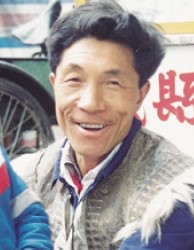Qiang, Dajishan in China

Photo Source:
Copyrighted © 2026
Operation China, Asia Harvest All rights reserved. Used with permission |
Send Joshua Project a map of this people group.
|
| People Name: | Qiang, Dajishan |
| Country: | China |
| 10/40 Window: | Yes |
| Population: | 12,000 |
| World Population: | 12,000 |
| Primary Language: | Qiang, Southern |
| Primary Religion: | Ethnic Religions |
| Christian Adherents: | 0.00 % |
| Evangelicals: | 0.00 % |
| Scripture: | Portions |
| Ministry Resources: | No |
| Jesus Film: | Yes |
| Audio Recordings: | Yes |
| People Cluster: | Tibeto-Burman, other |
| Affinity Bloc: | Tibetan-Himalayan Peoples |
| Progress Level: |
|
Introduction / History
The Qiang are one of the oldest and most famous of China's peoples. In ancient times they numbered 62 different tribes. Today's official Qiang nationality is a collection of 11 different tribes and languages, including the Dajishan Qiang. Numerous references to the Qiang tribes, dating back 4,000 years, are found in Chinese history. Sandwiched between the wild, warlike Tibetans to the west and the expanding Chinese to the east, these various nomadic tribes came to be known as the Qiang, a name that one source says means "herdsmen."
Linguist James Matisoff in 1991 discovered there to be "9 or 10 Qiangic languages." The Qiang have a legend of once possessing a script and "lost book" of their own. Dajishan Qiang is part of the Southern Qiang linguistic group. One linguist says, "Southern Qiang has been divided by researchers into five sub-dialects (including Dajishan) which are considered to be too divergent from each other to permit communication between people from different villages."
What Are Their Lives Like?
Almost all Qiang weddings and festivals are scheduled during the tenth month of the year. On the eve of the wedding day the bridegroom's family will send a "gift-bearer" to the bride's home with presents. After the wedding feast, which may last up to ten hours, the custom of "singing in the hall" commences. "The bride, whose face is veiled by a handkerchief, will first sing a song to bid farewell to her parents and thank them for her upbringing. She is then followed by the bridesmaids who will sing a song persuading her to go to the groom and live with him as man and wife."
What Are Their Beliefs?
Most Qiang are polytheists. "They believe that everything on earth - the earth itself, the sky, the sun, trees, fire, saplings, doors, even cauldron supports, pillars, white stones etc. - has a soul and they are all to be worshipped. They have no idols of any deity but choose a kind of milk-white stone as the symbol of all deities. Usually on the back wall on the top floor of every house there are five white stones representing deities of Heaven, Earth and Mountains.".
Thomas F. Torrance, from Scotland, was the first Protestant missionary among the Qiang. He served with the China Inland Mission from 1895 to 1909 and then with the American Bible Society until the 1930s. Torrance reported, "scores and scores of Christian converts among these tribesmen, especially in the Wenchuan and Weizhou [Maoxian] areas, and seven meeting places established around Tongmenwai." There are several hundred Qiang believers today, but it is unclear if any are from the Dajishan Qiang language group who live in Lixian County.
What Are Their Needs?
Their hearts need to be opened to faith in one God, despite the traditions that they have been taught over many years.
Prayer Points
Pray for a movement to monotheism and Christ in this generation.
Pray that they would recognize in their hearts that the worship of all things is empty in contrast to a relationship with the maker of heaven and earth.
Pray that the Lord would remove mountains of obstacles in order to get the gospel to the Dajishan Qiang people.